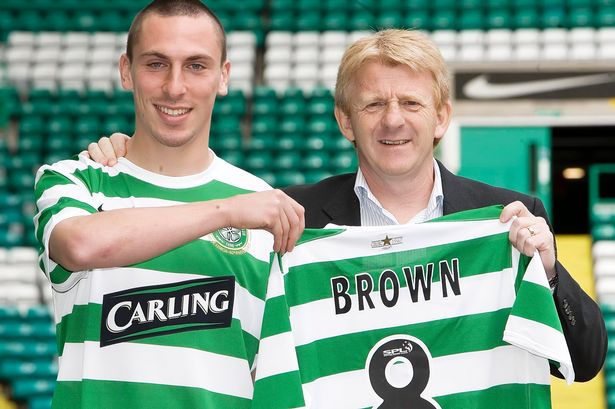Scott Brown: A Titan of Scottish Football
- Mark Devlin

- Apr 2, 2021
- 5 min read

In an era of absolute dominance, the Celtic captain has stood tall and been counted, cementing his place as a true club legend.
I’ve had a 14 fantastic years at this club and I’ve enjoyed every single moment of it. It’s been a wonderful career for myself, I’ve enjoyed the moments with the fans but it’s just a pity I can’t share the last remaining games with the fans in the stadium
Reading this quote from Scott Brown on Celtic's official Twitter account made the news of the captain's departure feel all too real. Up until now, I've struggled to find the words that do the midfielder justice. No player in the modern era of Scottish football epitomises a club quite like the 34-year-old. And yet, after 14 years of service to the Hoops, he's set to leave Celtic at the end of the current season.
A new chapter awaits the veteran. He will join former Hibs teammate and newly appointed Aberdeen manager Stephen Glass at the Dons in a player/coach role, penning a two-year deal at the club as they themselves are set to enter a new era.
Things haven't gone how Brown or anyone associated with Celtic would have liked this season, there's no denying that. Celtic were beaten to the title by rivals Rangers for the first time in a decade; hopes of ten league titles in a row spoiled in one abysmal campaign. Neil Lennon stepped down from his managerial role in February amidst a torrid season that seemed to throw-up one disaster after another.
Though despite a season to forget, it doesn't dispute Brown's achievements. Far from it.
A career in Glasgow's east end has spanned 14-years, with the success far outweighing the failure.
The early days
Coming through the youth ranks at Hibs, a fresh-faced Brown quickly became hot property. He was wanted by both of Glasgow's top teams and in the end chose to opt for Celtic. In 2007, the Hoops secured his services for a then record fee between Scottish clubs of £4.4 million.

A 22-year-old Scott Brown had little time to settle before making his Hoops debut against Kilmarnock. Ten days later and he made his European debut in a 1-1 draw with Spartak Moscow in Russia. He helped his side qualify for the Champions League group stages, where they enjoyed a successful campaign having defeated current UCL holders AC Milan, Benfica and Shakhtar Donestsk to reach the last-16. Brown played a pivotal role in helping guide Celtic to the title in his first season in Glasgow. They clinched top-spot by a margin of three points. Gordon Strachan was named manager of the year.
That wasn't all, however, as Brown himself was named PFA Player of the Year 2007/2008 for his outstanding contribution in sealing three titles in a row. The league win was dubbed "A title for Tommy" in honour of the late Tommy Burns, former Celtic player and manager who passed away a week prior following a battle with cancer.

The start of the road to nine-in-a-row
It may have been Tony Mowbray that gave Brown the captain's armband, but his reign as captain truly began under Neil Lennon. The former Hoops midfielder was appointed as manager in June 2010, marking the beginning of a successful first-spell as the boss.
Brown's first full season as captain saw him lift the Scottish Cup, a solid 3-0 win over Motherwell at Hampden marked Broony's first piece of silverware as captain, and was his first taste of Scottish Cup glory in his career.
Celtic won back their league crown in 2011/2012 after a three-year drought. Brown once again paramount in his side's success, he showed great versatility having played as a right-midfielder on occasion rather than his usual central midfield role.
Brown sealed his first trophy double as the Hoops enjoyed success in both the Scottish Premiership and League Cup. The taste of silverware was once again becoming a formality at the club.

Lennon announced he would be departing Celtic in May 2014, with Ronny Deila set to replace him. The Norwegian was set to be the fourth manager Brown had played under in seven years.
Deila lasted two seasons, guiding the club to two league titles and a league cup. He and Brown didn't always see eye-to-eye on matters, with the skipper later revealing that training "wasn't hard enough" under the Norwegian coach.
"One of the pillars of this club"
In May 2016, Brendan Rodgers was chosen as Ronny Deila's successor. The former Liverpool manager was appointed a month after Rangers had knocked Celtic out of the Scottish Cup semi-final on penalties; he had ambitions to take the club to higher standards having seen Celtic's performance.
Though Rodgers made it known to Brown that he was not happy with the way he carried himself in the public eye. Images of the Celtic captain slumped against a wall, eating a kebab days before the 2015 Scottish League Cup final sent alarm bells ringing.
In an interview celebrating Scott Brown's club career, Rodgers didn't shy away from being honest:
Obviously leading into that game (2015 League Cup final) Scott was sat on the street having had a night out.
And the point I was making to him straight away was, 'You can’t do that – if you want to be the best player you possibly can be and you want to lead a club of Celtic’s status, an institution, then you’re one of the pillars of this club.’
And from that moment on he was incredible for me.
Brown was 31-years-old when Rodgers was appointed. For many players reaching 30 signals the beginning of their decline, but not Brown. Rodgers had a plan for him: he wanted his captain to be more tactically tuned-in while continuing to impose his trademark on-pitch personality at the same time.
It wasn't long before results showed. The Hoops swepped aside the competition to win an invincible treble: racking up 106 points to win the league unbeaten, no one could stop them from lifting both domestic trophies either. 47 games, 43 wins and 4 draws: it was clear that Rodgers was building a cognitive machine, unmatched by anyone else in the country.
The Rodgers dynasty continued into the next season. For Brown individually, this campaign was a perfect summary of the transformation he had endured under the Northern Irishman. The Celts made it two trebles in a row, once again boasting their firepower and not showing any signs of stopping.
Brown was perhaps more pivotal in this season than any other. He was voted PFA Scotland Player of the Year for a second time, the only player to achieve this after Henrik Larsson. The 32-year-old made an incredible 52 appearances during the 2017/2018 season, proof that he was becoming a 24-hour athlete to prolong his career.

Another treble was secured the following season, with Rodgers departing in the middle of the season for Leicester. Neil Lennon made a return on an interim basis, though it was Brown and his teammates who dragged the club through the remainder of the 2018/19 season to seal the league and Scottish Cup.
Lennon was given the role permanently, with the club securing a historic Quadruple Treble in 2020. The Hoops had won the last twelve trophies in a row, with Brown leading guiding them to glory in evrry single one.
The 35-year-old will no doubt look back on his trophy-laden career fondly. His haul of 22 major honours at the club makes him the third most decorated Celt of all time and the most successful captain since Billy McNeil.
Ten league titles, five Scottish Cups and six League Cups throughout his 14-year Hoops career. He will undoubtedly go down as a club legend and will be sorely missed when he departs this summer.
In the modern era, Scott Brown is Mr Celtic.
Comments